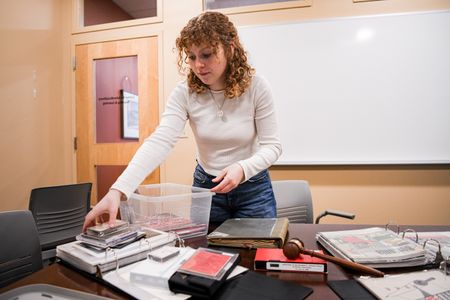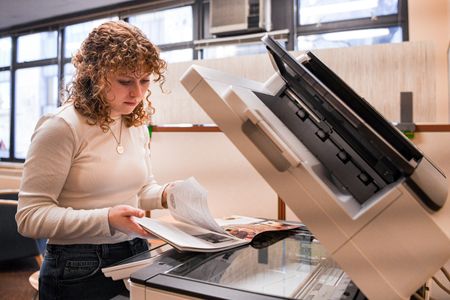CGS Gets an Archive
Student Camille Housh digitized the college’s collection of historical documents dating back to 1948
By Chelsea Feinstein

How did Camille Housh spend her summer vacation? She took a deep dive into CGS’ history, using her experience working at a museum to create an archival system housing the college’s collection of historical documents.
Housh (’23, CAS’25) worked through the summer and part of the fall of 2023 to organize, file, digitize, and collect background information on a collection of more than 400 newspapers, photographs, student publications, and other documents dating back to 1948.
The documents chronicle major changes throughout CGS’ history, including two name changes, a move from Boylston Street to Commonwealth Avenue, and the creation of the Capstone project and other key CGS initiatives.

Housh, a history major, says getting to see and preserve artifacts of the college’s past gave her a new perspective on the present.
“Especially with something like CGS—which has a sort of unique goal within the broader BU community of interdisciplinary learning and the emphasis on team learning and your connection with the faculty—to be able to look back at the history of how that developed and how that always has been core to the goals of CGS, I feel like it can help make the achievements of present time even more special,” Housh says.
Housh created both a physical and a digital filing system, with items organized by type and chronology. She scanned each item and worked to track down as much background information on the documents as possible, annotating them with every detail she was able to find.
She particularly enjoyed reading old newspapers that put students’ experiences into context and seeing a 30-year-old photo of one of her teachers, Robert Wexelblatt, a professor of humanities.
The archive will be used in future anniversary celebrations to highlight CGS history and to help with requests from alumni, says Dean Natalie McKnight.
Housh’s work was funded through the Student Internship Experience, a growing program run by the Center for Interdisciplinary Teaching & Learning at CGS that allows students to be matched with a paid internship opportunity within the college or through a CGS alumnus, or to be supported with funding from CITL to participate in an external internship that would otherwise be unpaid.

The archiving internship was the second one Housh landed through CGS’ Student Internship Experience. In the spring of 2023, she worked at the Gibson House Museum, a preserved 1860 Victorian home in Boston’s Back Bay, with financial support from CGS.
“I got to work hands-on with artifacts, which was really special,” Housh says. “And I also got to use some of my photography skills to help them update their digital archive system.”
Housh says her work at the Gibson House helped prepare her to take on the CGS project, where she was considered the expert and given the freedom to create the organizational system she thought would best preserve the artifacts.
“I’ve gained some confidence from what I learned at the Gibson House,” she says. “I was proud to be heading this project. It felt nice to be confident in my ability to create this system and to see the end result of the work I’ve done.”
After completing the CGS archive project, Housh has stayed on as a CGS intern, helping CITL to further develop its Student Internship Experience program so that future students can take advantage of opportunities like the ones she’s had. This role includes helping to curate a list of potential internship placements for CGS students.
“I think a lot of people have in their mind that it’s this competitive field, where you apply to all the big internships and if you don’t get it, you’re discouraged,” she says. “But to know that there’s a support system and a program in place to help you not only find internships, but find the support to make those internships possible, I think can be a real encouragement for students.”
She adds that for many students, it’s not financially possible to accept an internship that does not pay. “So, I think the fact that there is this program that’s willing to provide the financial support opens that door for more students to be able to take those opportunities.”